In this lesson, you will learn how your human and social capital relate to your financial well-being. Specifically, this lesson will cover:
1. Shaping Your Financial Journey
We have discussed how financial knowledge and skills are essential in shaping your lifetime financial journey. Closely tied to these factors is your level of human and social capital.
-
Human capital is your ability and willingness to work, learn, earn, and make wise decisions about how to save and invest money.
-
Social capital is how well you are able to form connections with other people. As such, your social capital will affect the value of your human capital, particularly how much you earn over your working life span.
In this topic, we discuss how you can optimize your human and social capital to help you increase your financial well-being and achieve your financial goals. You will explore how practicing agility can help you make sound financial decisions and solve a range of personal and professional problems.
-
- Human Capital
- Your ability and willingness to work, learn, earn, and make wise decisions about how to save and invest money.
- Social Capital
- Personal and professional connections with other people.
2. Human Capital
Human capital is your most valuable asset – something of value you own. In this section, we discuss those resources that can increase your human capital.
-
- Asset
- Something of value you own.
2a. Your Education and Earnings
Your earnings are an indicator of the value of your human capital in the labor market. Earnings are often closely associated with your level of formal education. The illustration below shows how annual earnings increase with formal education.
- Holding a professional degree – a legal or medical diploma, for example – is often a pathway to higher income and human capital.
- Those with an advanced academic degree tend to do better when the economy turns downward.
-
Those with little or no college education are more likely to lose a job during a recession than those with a college degree or higher level of education.
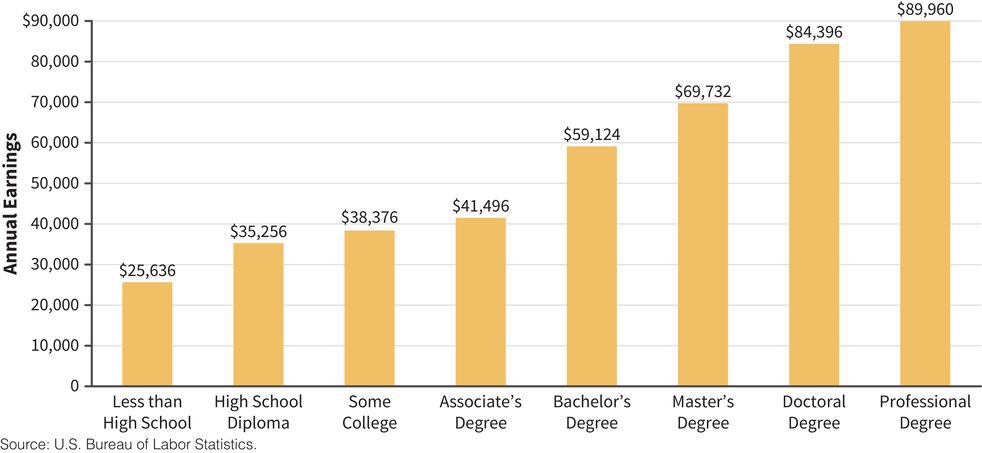
In addition to formal education, other resources also increase your human capital:
- Your health
- Your willingness to relocate to higher-paying job markets
- Continuing professional education and skill development
2b. Your Health
Health affects human capital in both the short and long run.
- Generally, healthy people work more hours and for a longer period of years over their life span compared to those with health problems.
- Thus, healthy people tend to earn more money on an annual basis, as well as over their lifetimes.
- Poor health may result in a lower standard of living across the life span.
Taking care of your body and mind so that you can continue to work is a valuable human capital investment. Consider the behaviors shown in the illustration. Actively managing your health by eating a healthy diet, avoiding substance abuse, and preventing and minimizing accidents (by wearing your seatbelt and never texting while driving) all add up to a healthy lifestyle that will extend your life and increase your human capital.
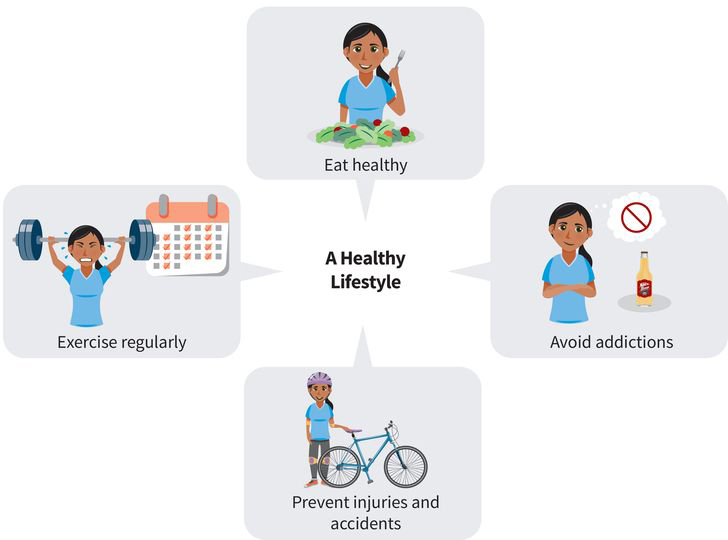
2c. Willingness to Relocate
Relocating to where specific types of human capital are more valued also increases how much you can earn.
-
Those who are mobile tend to earn a higher income over their lifetime financial journey because they can take advantage of location-specific higher income from their work, making it easier to save more money over their work life. There are also often greater job opportunities for individuals willing to work in a foreign country.
-
EXAMPLE
When oil prices are high, mechanics, construction workers, and other skilled and unskilled workers can make more money moving to the oil fields of North Dakota, Alaska, and West Texas compared to staying in places where their skills may not be valued as highly.
2d. Continuing Education and Skill Development
In addition to formal education, you can also gain valuable human capital through on-the-job training and continuing professional education to:
- Develop specific skills
- Practice attained skills
- Apply skill sets
However, as the economy fluctuates, some forms of human capital may become obsolete.
Pursuing education or training can increase your employability and make you more valuable to employers. Can you think of a situation where you (or someone you know) has used their problem solving or agility skills to increase their human capital in order to get a better job or earn more income?
-
There was a time when architecture firms hired drafting experts based on drawing skills. But with the advent of computer-aided design (CAD), those in traditional drafting positions had to learn new skills to stay employed. Those who were either unable or unwilling to transition their skill set found that their services were no longer valued or even needed. On the other hand, those who were well-versed in CAD saw their salary levels rise.
A key takeaway is this: through continued learning and training, you can preserve and increase your earning potential. Strong agility skills allow you to adapt and pivot as needed to ensure your financial security.
2e. The Relationship Between Human Capital and Financial Wealth
Over the course of your work life, you will want to convert the returns on your human capital, such as earnings, into other forms of wealth, such as retirement savings, real estate, and other assets. This reflects a natural progression.
- Early in your career, your human capital increases because you are gaining additional education, training, and experience, and likely relocating to accept better jobs.
- As you continue to gain work experience and additional professional education, your human capital becomes increasingly valuable.
- Over time, the increase in your human capital may slow because you have less time remaining before you need, or choose, to retire from paid work. However, if you plan wisely, you’ll notice that as you age, your financial wealth increases.
- At some point, you should be able to stop working and rely on your wealth to provide your financial support.
The progressive relationship between human capital and wealth is shown in the illustration.
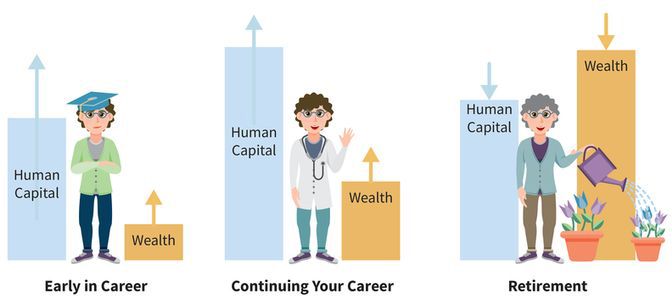
3. Social Capital
Unlike human capital, social capital is not found in individuals themselves but rather in the space between individuals, or the network of connections among people. You never know when these connections can help you solve a problem. The illustration below shows how your social capital is shaped by informal and formal networks.
-
Be wary of how you present yourself on social media sites and with whom you are sharing your personal information. Employers, for example, routinely monitor such sites when hiring and might be making skewed evaluations about your personal and professional qualifications based on what they see.
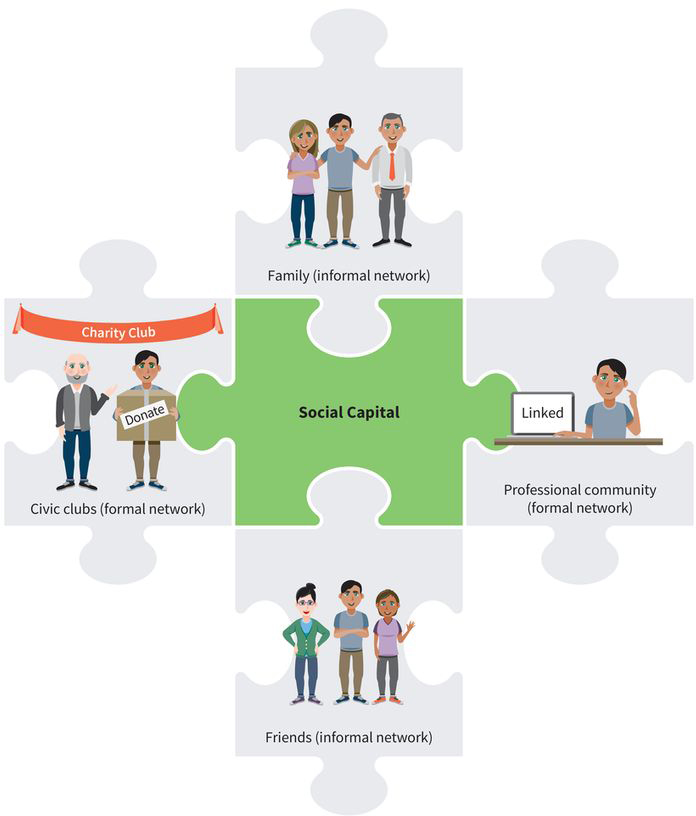
3a. Informal Networks
Informal networks are the interpersonal relationships you form with your family and close friends.
- Informal networks can provide encouragement and support.
- People in your network might help you find work, give you a place to stay, or lend you money.
People receive many of life’s joys from these close relationships. As such, it’s important to keep these relationships strong and healthy.
3b. Formal Networks
Formal networks connect you with people in professional, recreational, leisure, and social communities.
- Formal networks include clubs, organizations, and professional associations.
-
A large professional social media network is LinkedIn.
- You will find that these types of broader networks will help you advance in your career.
Establishing a variety of professional networks early in life can be valuable as a source of potential contacts for employment.
Alice was asked to prepare a list of speakers for an upcoming conference. She was given little guidance and had a tight deadline. She decided to reach out to some contacts she had made on LinkedIn. Thankfully, several of her contacts were able to help connect her with other professionals who could commit to the conference. Alice used her problem solving skills to find a solution and meet her deadline.
-
- Informal Network
- The interpersonal relationships you form with your family and close friends.
- Formal Network
- Interpersonal relationships that connect you with people in professional, recreational, leisure, and social communities.
4. The College Payoff
As we discussed previously, education tends to be positively associated with greater earnings. Let’s now take a closer look at how your choice of college and degree program can affect both your human and social capital.
In today’s highly competitive world, the search for educational value – the point where returns through job placements, income, and human capital outweigh the costs of attendance – is a worthwhile activity. Some of the costs and benefits associated with investing in your human capital are shown in the illustration below.
- When you go to school to gain new knowledge and skills, you incur costs, such as tuition, fees, and books.
- You may lose some current earnings while you attend school.
- You might need to take out student loans.
- It is important, therefore, to make sure that the expected benefits of attaining additional education, at a minimum, cover these costs.
If you look at only the short-term costs and benefits, education might not seem worthwhile. However, if you look at the long-term payoff, the choice is usually easy: over a working lifetime, those with a professional degree will generally earn over $2 million more than those with only a high school diploma!
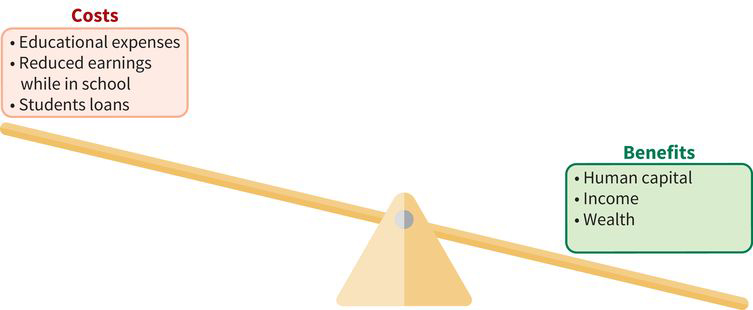
-
- Educational Value
- The point where returns through job placements, income, and human capital outweigh the costs of attendance.
There is a direct relationship between human capital and financial wealth. Taking care of your health, investing in yourself, and developing skills are key to shaping your financial journey. Data shows that graduating from college pays off because continuing education leads to more earnings. The payoff is even greater if you’re flexible in your thinking, such as being willing to relocate to obtain an advanced degree or to take on a new job.
Remember that you’re not alone on your financial journey. Family and friends in your informal network are there to support you. Colleagues and professionals in your formal network are also in your court to help build your skills and assist you with financial decisions.
You examined how strong agility and problem solving skills can help you make these wise investments in yourself. The time and effort taken to develop your human and social capital can pay big dividends in the end. Whether it is landing a better paying job or finding the solution to a problem at work...knowing when and where to make those investments in yourself is key!
Source: This content has been adapted from Chapter 1.2 of Introduction to Personal Finance: Beginning Your Financial Journey. Copyright © 2019 John Wiley & Sons, Inc. All rights reserved. Used by arrangement with John Wiley & Sons, Inc.
Wiley and the Wiley logo are trademarks or registered trademarks of John Wiley & Sons, Inc. and/or its affiliates in the United States and other countries.




